Executive Director Resume Examples

Jul 18, 2024
|
12 min read
Land the Leadership Role: Your Ultimate Guide to Crafting an Executive Director Resume
Rated by 348 people
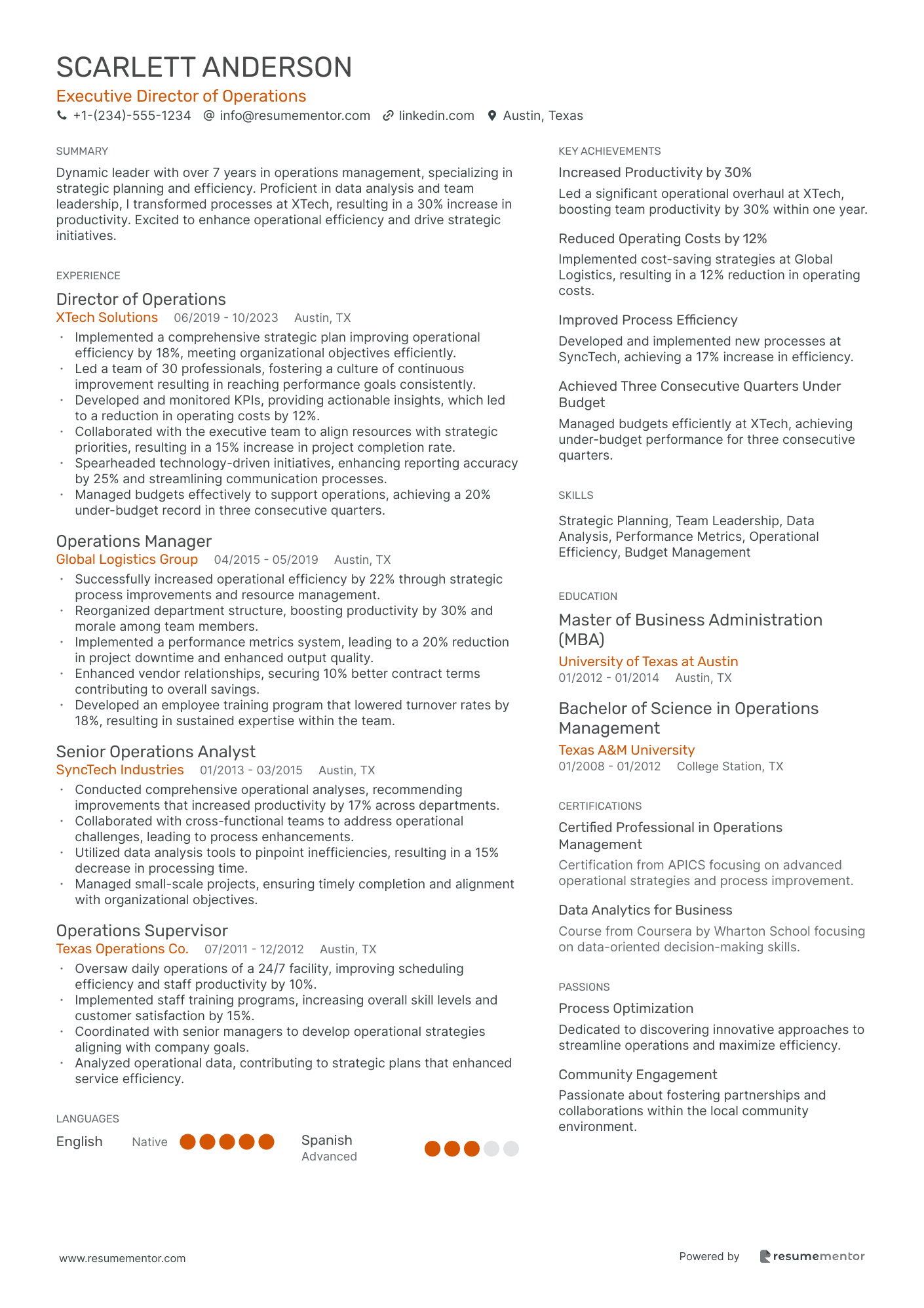
Executive Director of Operations
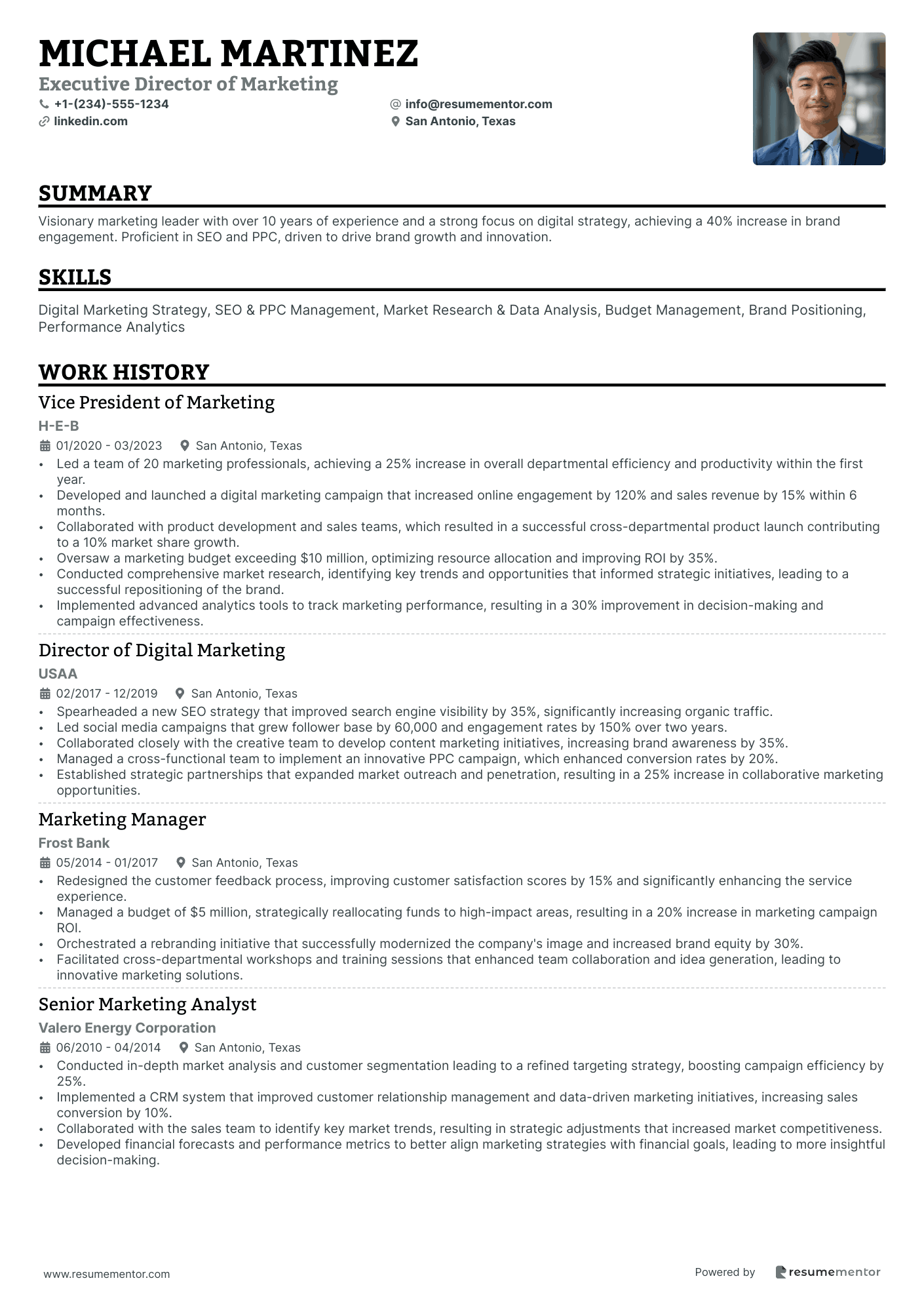
Executive Director of Marketing
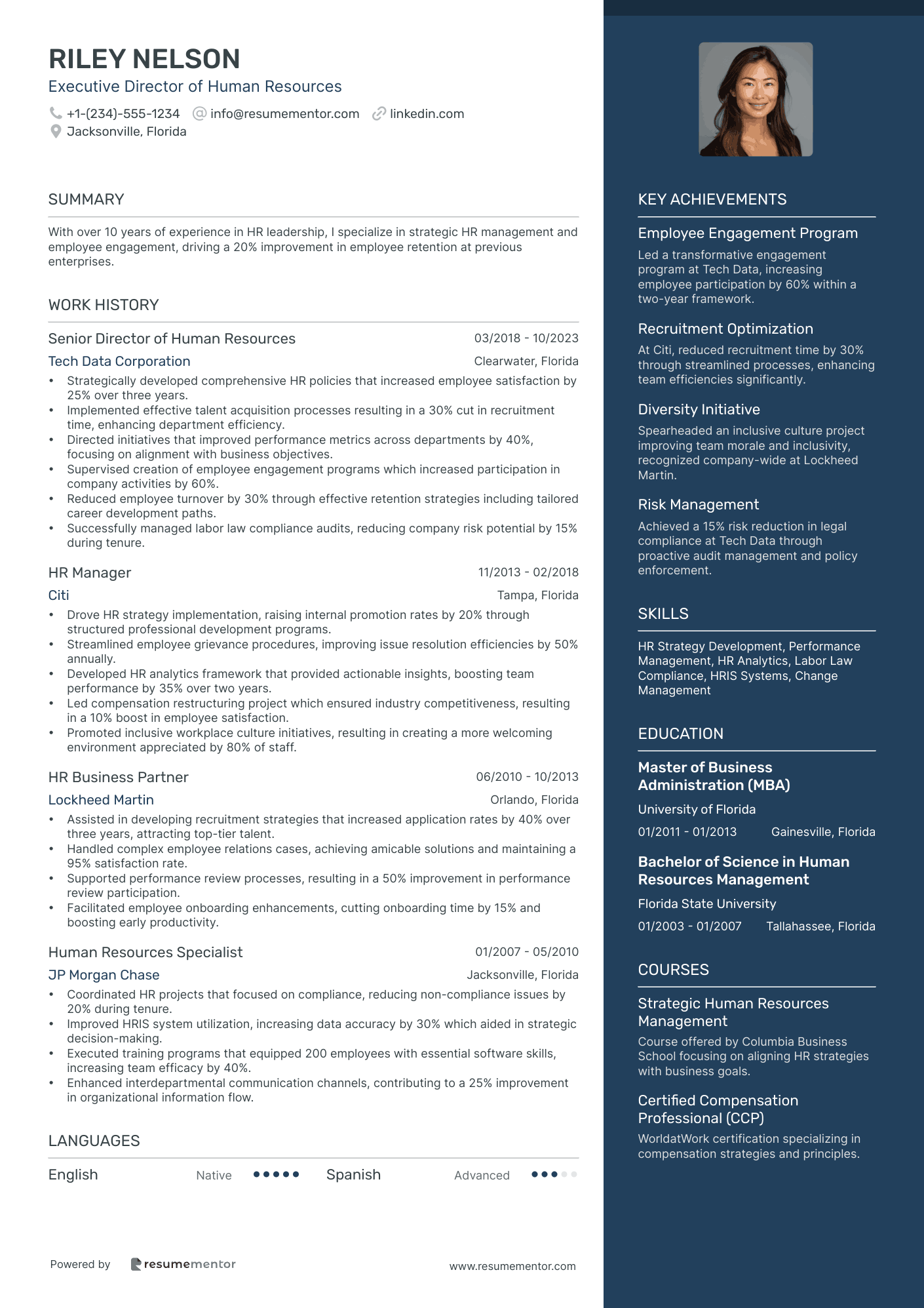
Executive Director of Human Resources
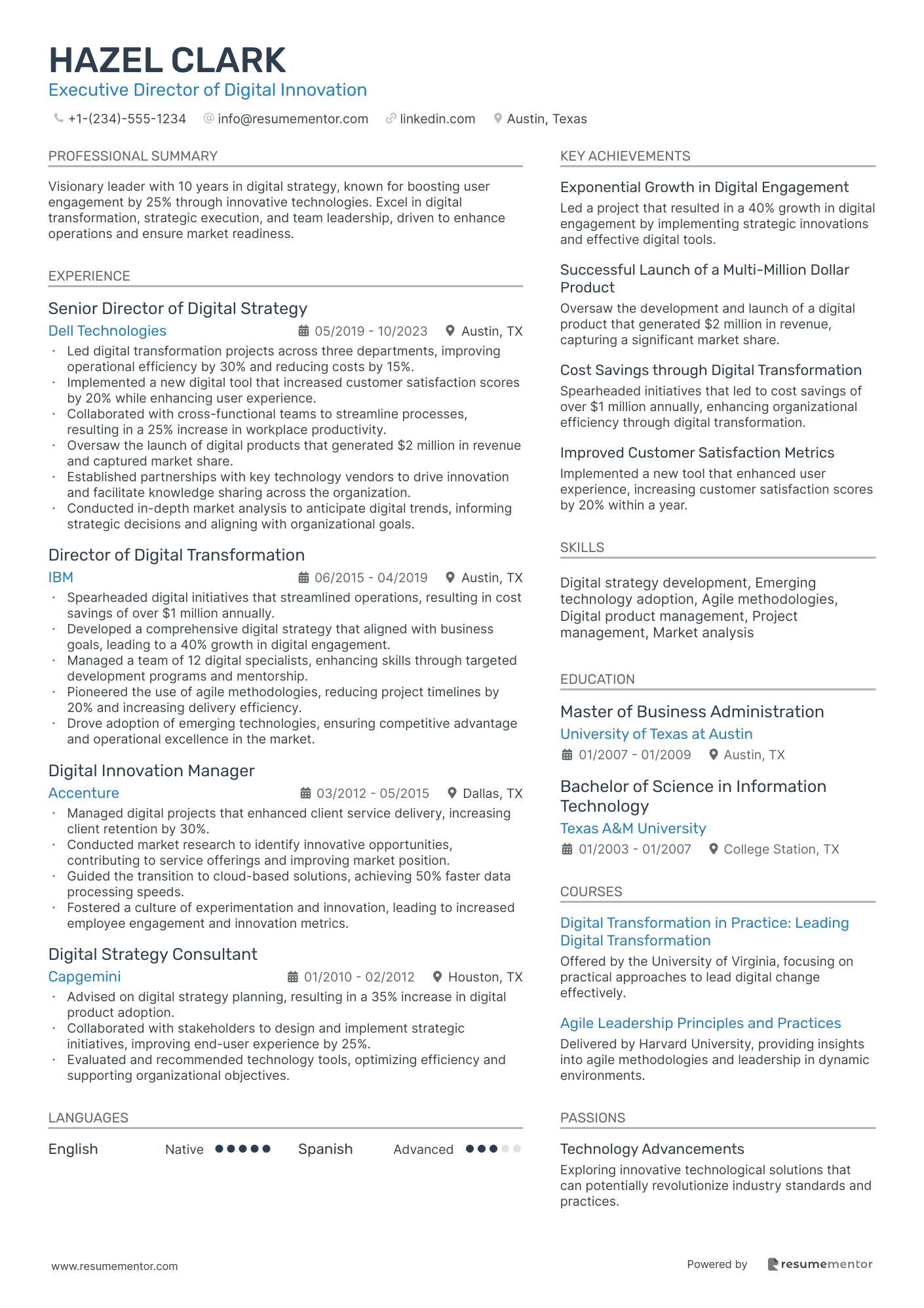
Executive Director of Digital Innovation
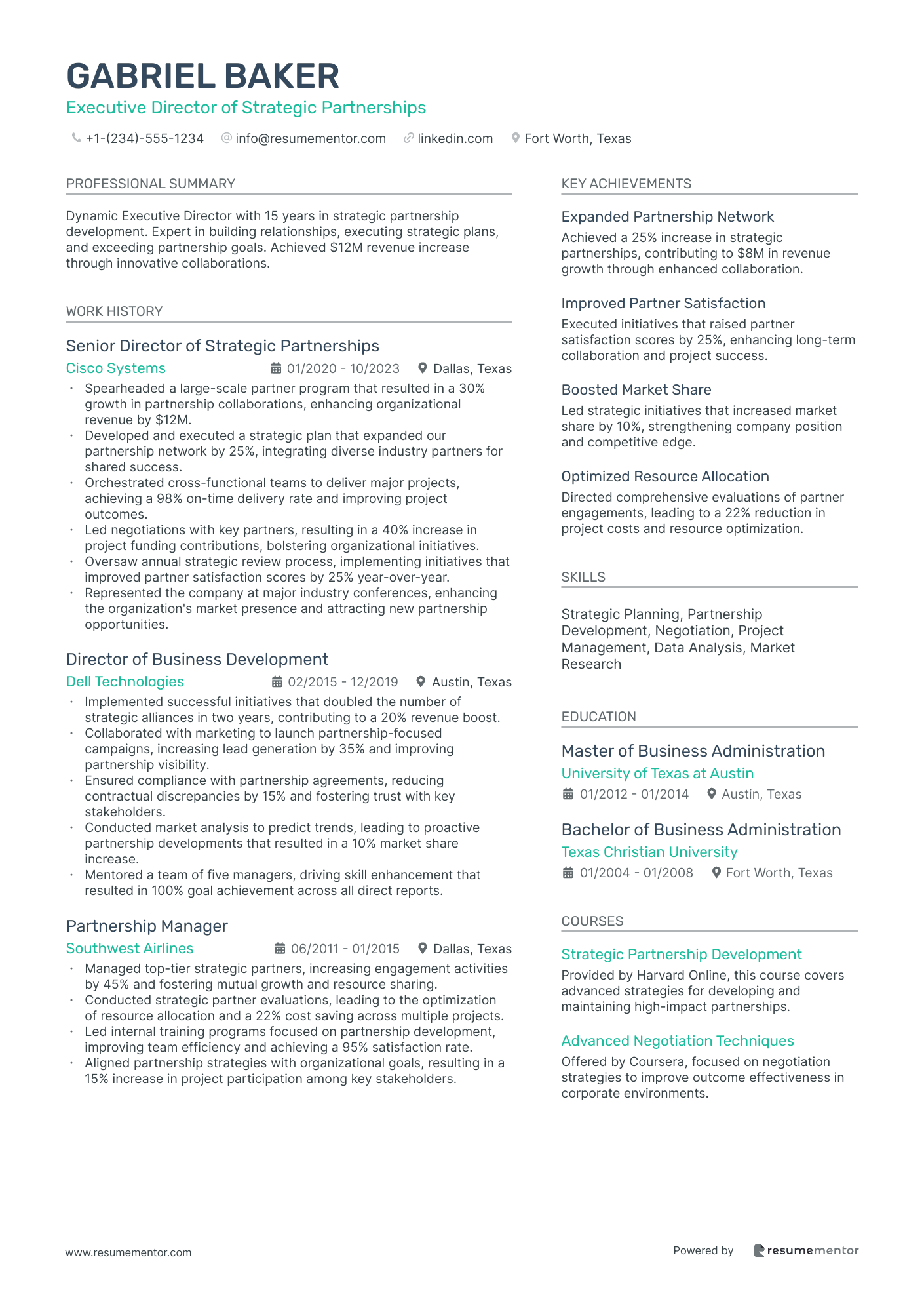
Executive Director of Strategic Partnerships
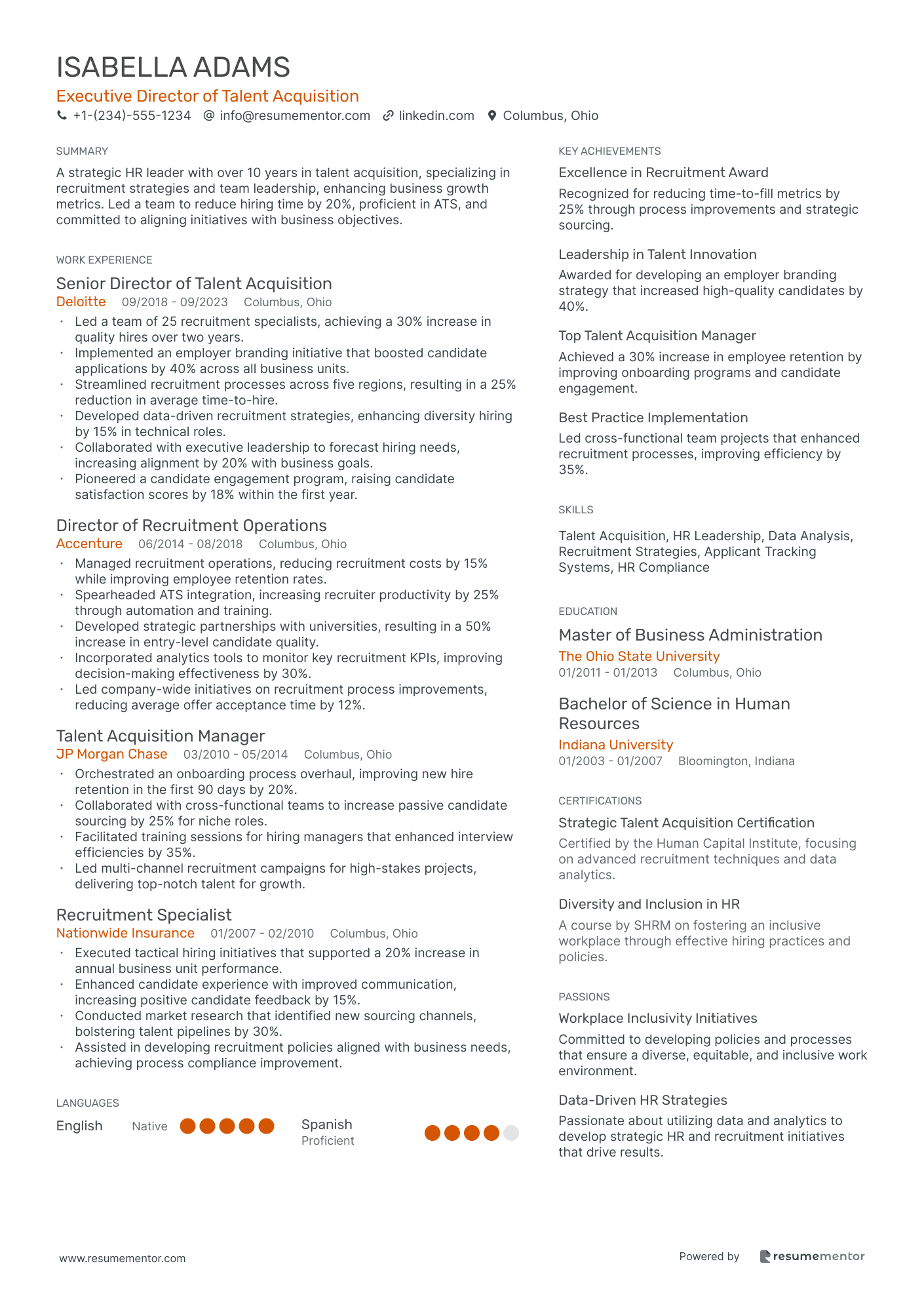
Executive Director of Talent Acquisition
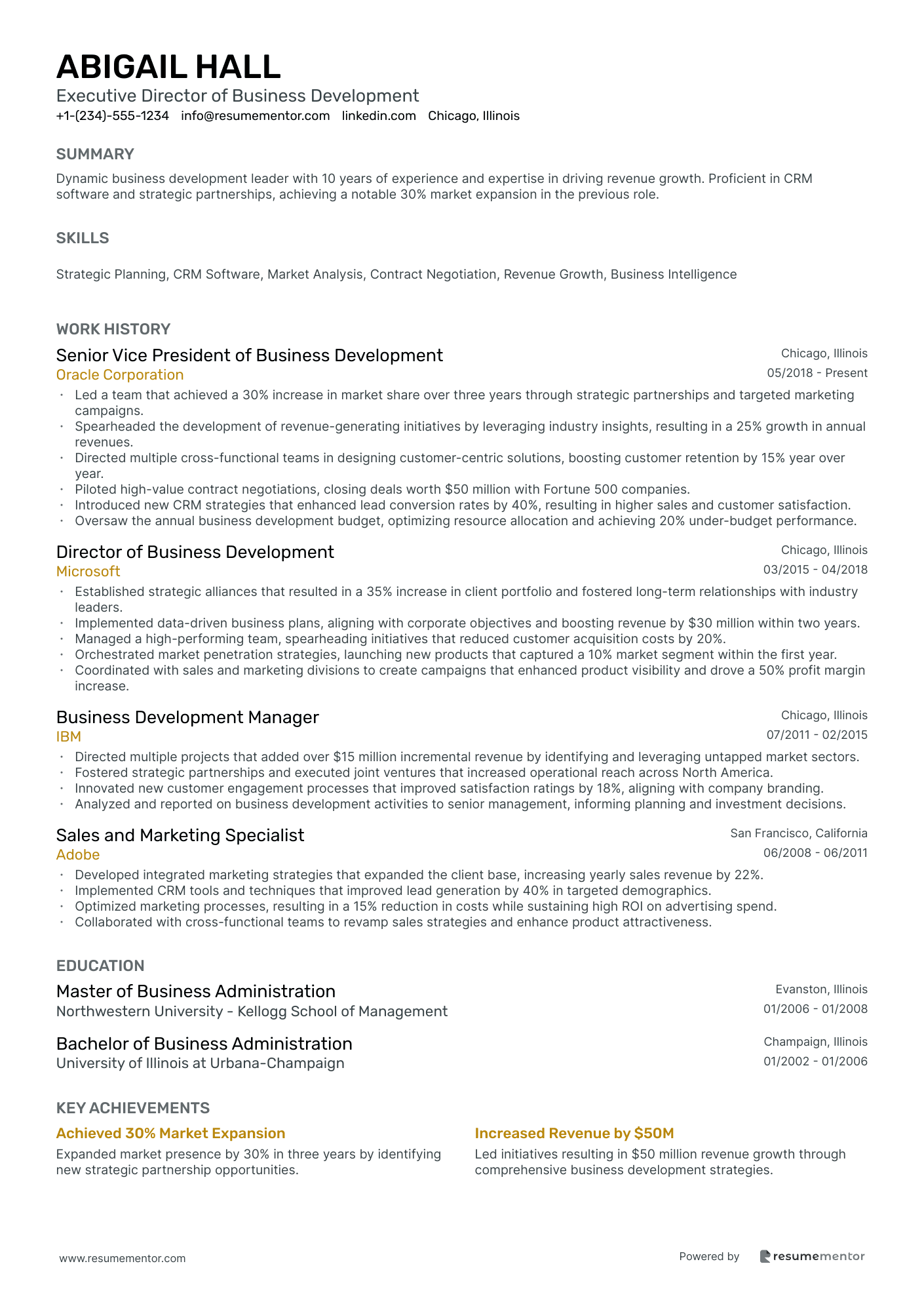
Executive Director of Business Development
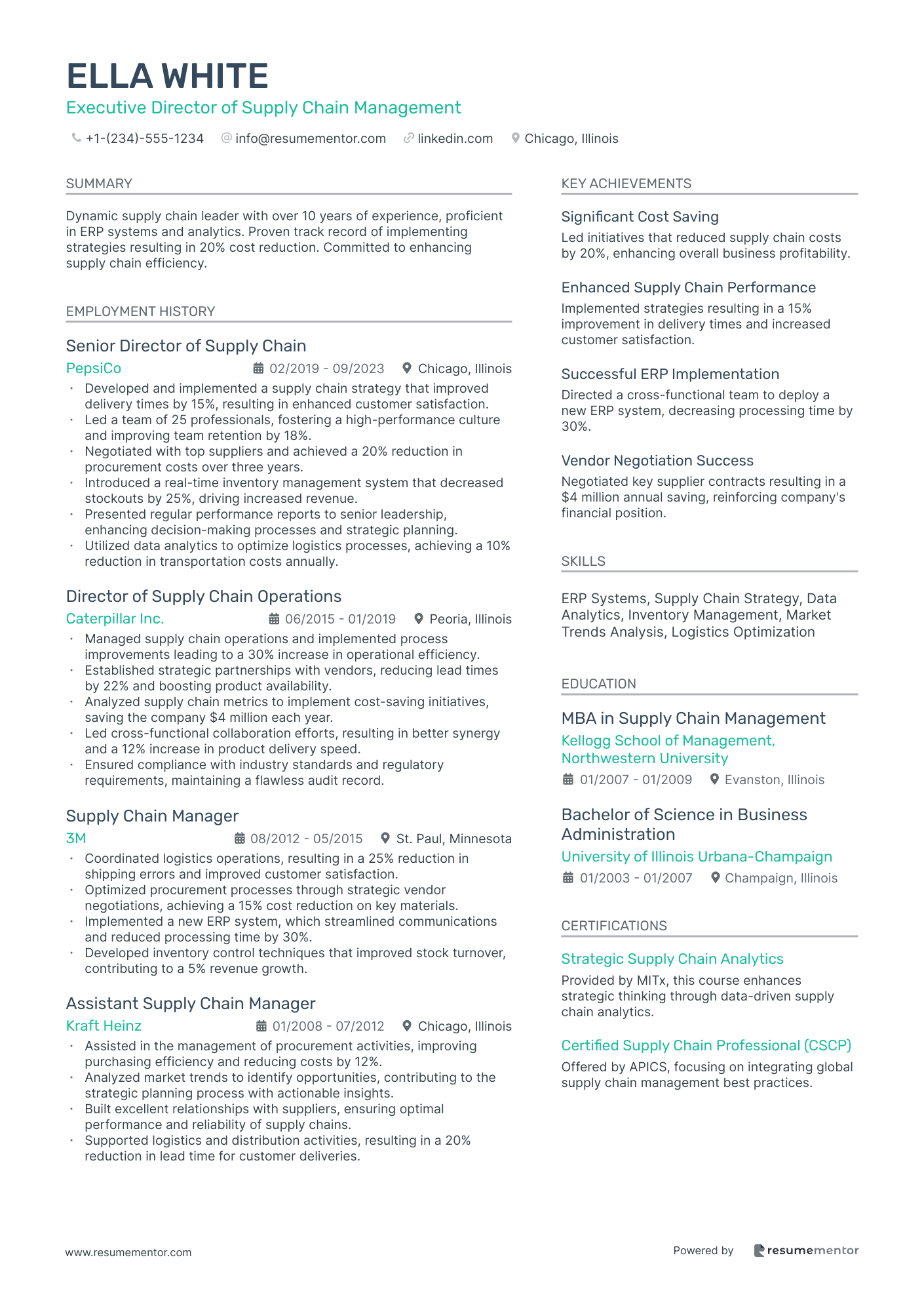
Executive Director of Supply Chain Management
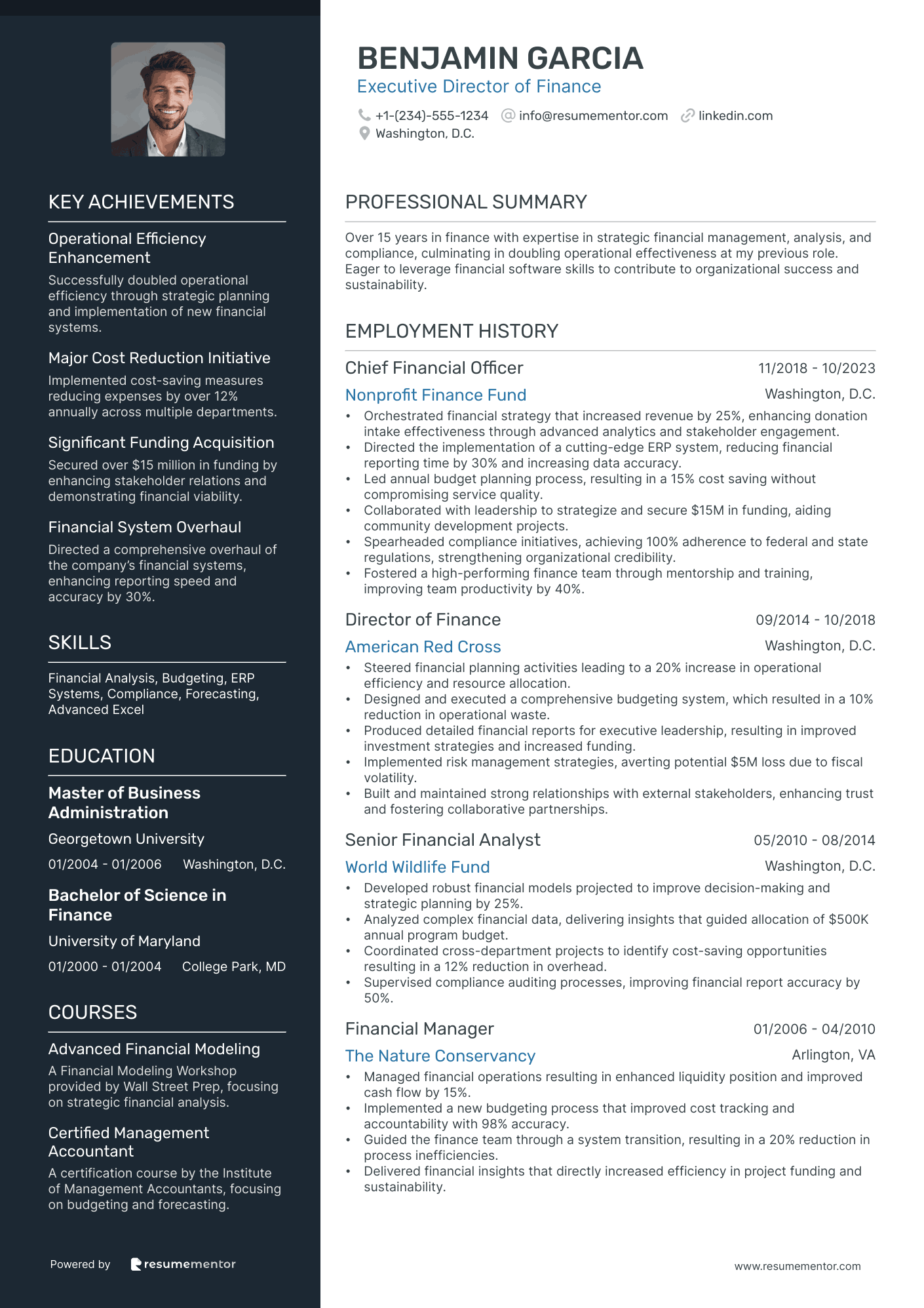
Executive Director of Finance
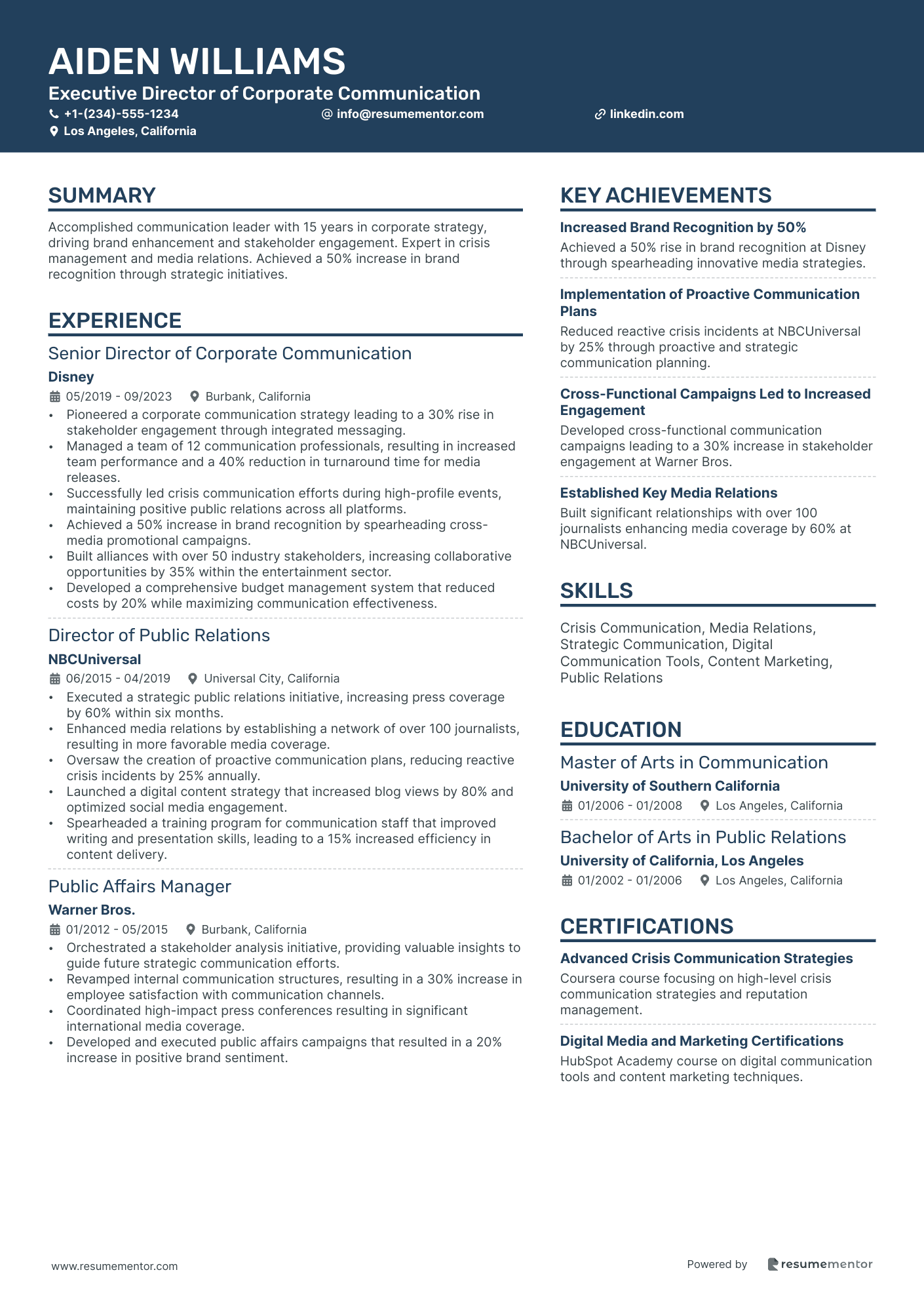
Executive Director of Corporate Communication

Executive Director of Operations resume sample
- •Implemented a comprehensive strategic plan improving operational efficiency by 18%, meeting organizational objectives efficiently.
- •Led a team of 30 professionals, fostering a culture of continuous improvement resulting in reaching performance goals consistently.
- •Developed and monitored KPIs, providing actionable insights, which led to a reduction in operating costs by 12%.
- •Collaborated with the executive team to align resources with strategic priorities, resulting in a 15% increase in project completion rate.
- •Spearheaded technology-driven initiatives, enhancing reporting accuracy by 25% and streamlining communication processes.
- •Managed budgets effectively to support operations, achieving a 20% under-budget record in three consecutive quarters.
- •Successfully increased operational efficiency by 22% through strategic process improvements and resource management.
- •Reorganized department structure, boosting productivity by 30% and morale among team members.
- •Implemented a performance metrics system, leading to a 20% reduction in project downtime and enhanced output quality.
- •Enhanced vendor relationships, securing 10% better contract terms contributing to overall savings.
- •Developed an employee training program that lowered turnover rates by 18%, resulting in sustained expertise within the team.
- •Conducted comprehensive operational analyses, recommending improvements that increased productivity by 17% across departments.
- •Collaborated with cross-functional teams to address operational challenges, leading to process enhancements.
- •Utilized data analysis tools to pinpoint inefficiencies, resulting in a 15% decrease in processing time.
- •Managed small-scale projects, ensuring timely completion and alignment with organizational objectives.
- •Oversaw daily operations of a 24/7 facility, improving scheduling efficiency and staff productivity by 10%.
- •Implemented staff training programs, increasing overall skill levels and customer satisfaction by 15%.
- •Coordinated with senior managers to develop operational strategies aligning with company goals.
- •Analyzed operational data, contributing to strategic plans that enhanced service efficiency.
Executive Director of Marketing resume sample
- •Led a team of 20 marketing professionals, achieving a 25% increase in overall departmental efficiency and productivity within the first year.
- •Developed and launched a digital marketing campaign that increased online engagement by 120% and sales revenue by 15% within 6 months.
- •Collaborated with product development and sales teams, which resulted in a successful cross-departmental product launch contributing to a 10% market share growth.
- •Oversaw a marketing budget exceeding $10 million, optimizing resource allocation and improving ROI by 35%.
- •Conducted comprehensive market research, identifying key trends and opportunities that informed strategic initiatives, leading to a successful repositioning of the brand.
- •Implemented advanced analytics tools to track marketing performance, resulting in a 30% improvement in decision-making and campaign effectiveness.
- •Spearheaded a new SEO strategy that improved search engine visibility by 35%, significantly increasing organic traffic.
- •Led social media campaigns that grew follower base by 60,000 and engagement rates by 150% over two years.
- •Collaborated closely with the creative team to develop content marketing initiatives, increasing brand awareness by 35%.
- •Managed a cross-functional team to implement an innovative PPC campaign, which enhanced conversion rates by 20%.
- •Established strategic partnerships that expanded market outreach and penetration, resulting in a 25% increase in collaborative marketing opportunities.
- •Redesigned the customer feedback process, improving customer satisfaction scores by 15% and significantly enhancing the service experience.
- •Managed a budget of $5 million, strategically reallocating funds to high-impact areas, resulting in a 20% increase in marketing campaign ROI.
- •Orchestrated a rebranding initiative that successfully modernized the company's image and increased brand equity by 30%.
- •Facilitated cross-departmental workshops and training sessions that enhanced team collaboration and idea generation, leading to innovative marketing solutions.
- •Conducted in-depth market analysis and customer segmentation leading to a refined targeting strategy, boosting campaign efficiency by 25%.
- •Implemented a CRM system that improved customer relationship management and data-driven marketing initiatives, increasing sales conversion by 10%.
- •Collaborated with the sales team to identify key market trends, resulting in strategic adjustments that increased market competitiveness.
- •Developed financial forecasts and performance metrics to better align marketing strategies with financial goals, leading to more insightful decision-making.
Executive Director of Human Resources resume sample
- •Strategically developed comprehensive HR policies that increased employee satisfaction by 25% over three years.
- •Implemented effective talent acquisition processes resulting in a 30% cut in recruitment time, enhancing department efficiency.
- •Directed initiatives that improved performance metrics across departments by 40%, focusing on alignment with business objectives.
- •Supervised creation of employee engagement programs which increased participation in company activities by 60%.
- •Reduced employee turnover by 30% through effective retention strategies including tailored career development paths.
- •Successfully managed labor law compliance audits, reducing company risk potential by 15% during tenure.
- •Drove HR strategy implementation, raising internal promotion rates by 20% through structured professional development programs.
- •Streamlined employee grievance procedures, improving issue resolution efficiencies by 50% annually.
- •Developed HR analytics framework that provided actionable insights, boosting team performance by 35% over two years.
- •Led compensation restructuring project which ensured industry competitiveness, resulting in a 10% boost in employee satisfaction.
- •Promoted inclusive workplace culture initiatives, resulting in creating a more welcoming environment appreciated by 80% of staff.
- •Assisted in developing recruitment strategies that increased application rates by 40% over three years, attracting top-tier talent.
- •Handled complex employee relations cases, achieving amicable solutions and maintaining a 95% satisfaction rate.
- •Supported performance review processes, resulting in a 50% improvement in performance review participation.
- •Facilitated employee onboarding enhancements, cutting onboarding time by 15% and boosting early productivity.
- •Coordinated HR projects that focused on compliance, reducing non-compliance issues by 20% during tenure.
- •Improved HRIS system utilization, increasing data accuracy by 30% which aided in strategic decision-making.
- •Executed training programs that equipped 200 employees with essential software skills, increasing team efficacy by 40%.
- •Enhanced interdepartmental communication channels, contributing to a 25% improvement in organizational information flow.
Executive Director of Digital Innovation resume sample
- •Led digital transformation projects across three departments, improving operational efficiency by 30% and reducing costs by 15%.
- •Implemented a new digital tool that increased customer satisfaction scores by 20% while enhancing user experience.
- •Collaborated with cross-functional teams to streamline processes, resulting in a 25% increase in workplace productivity.
- •Oversaw the launch of digital products that generated $2 million in revenue and captured market share.
- •Established partnerships with key technology vendors to drive innovation and facilitate knowledge sharing across the organization.
- •Conducted in-depth market analysis to anticipate digital trends, informing strategic decisions and aligning with organizational goals.
- •Spearheaded digital initiatives that streamlined operations, resulting in cost savings of over $1 million annually.
- •Developed a comprehensive digital strategy that aligned with business goals, leading to a 40% growth in digital engagement.
- •Managed a team of 12 digital specialists, enhancing skills through targeted development programs and mentorship.
- •Pioneered the use of agile methodologies, reducing project timelines by 20% and increasing delivery efficiency.
- •Drove adoption of emerging technologies, ensuring competitive advantage and operational excellence in the market.
- •Managed digital projects that enhanced client service delivery, increasing client retention by 30%.
- •Conducted market research to identify innovative opportunities, contributing to service offerings and improving market position.
- •Guided the transition to cloud-based solutions, achieving 50% faster data processing speeds.
- •Fostered a culture of experimentation and innovation, leading to increased employee engagement and innovation metrics.
- •Advised on digital strategy planning, resulting in a 35% increase in digital product adoption.
- •Collaborated with stakeholders to design and implement strategic initiatives, improving end-user experience by 25%.
- •Evaluated and recommended technology tools, optimizing efficiency and supporting organizational objectives.
Executive Director of Strategic Partnerships resume sample
- •Spearheaded a large-scale partner program that resulted in a 30% growth in partnership collaborations, enhancing organizational revenue by $12M.
- •Developed and executed a strategic plan that expanded our partnership network by 25%, integrating diverse industry partners for shared success.
- •Orchestrated cross-functional teams to deliver major projects, achieving a 98% on-time delivery rate and improving project outcomes.
- •Led negotiations with key partners, resulting in a 40% increase in project funding contributions, bolstering organizational initiatives.
- •Oversaw annual strategic review process, implementing initiatives that improved partner satisfaction scores by 25% year-over-year.
- •Represented the company at major industry conferences, enhancing the organization's market presence and attracting new partnership opportunities.
- •Implemented successful initiatives that doubled the number of strategic alliances in two years, contributing to a 20% revenue boost.
- •Collaborated with marketing to launch partnership-focused campaigns, increasing lead generation by 35% and improving partnership visibility.
- •Ensured compliance with partnership agreements, reducing contractual discrepancies by 15% and fostering trust with key stakeholders.
- •Conducted market analysis to predict trends, leading to proactive partnership developments that resulted in a 10% market share increase.
- •Mentored a team of five managers, driving skill enhancement that resulted in 100% goal achievement across all direct reports.
- •Managed top-tier strategic partners, increasing engagement activities by 45% and fostering mutual growth and resource sharing.
- •Conducted strategic partner evaluations, leading to the optimization of resource allocation and a 22% cost saving across multiple projects.
- •Led internal training programs focused on partnership development, improving team efficiency and achieving a 95% satisfaction rate.
- •Aligned partnership strategies with organizational goals, resulting in a 15% increase in project participation among key stakeholders.
- •Supported the development of strategic plans, facilitating a 10% increase in partnership opportunities through targeted market research.
- •Coordinated with cross-departmental teams to streamline project execution, achieving an 85% project completion rate.
- •Improved client management processes, enhancing communication and resulting in a 20% client satisfaction boost.
- •Initiated client engagement activities, producing informative material that contributed to a 12% rise in client retention rates.
Executive Director of Talent Acquisition resume sample
- •Led a team of 25 recruitment specialists, achieving a 30% increase in quality hires over two years.
- •Implemented an employer branding initiative that boosted candidate applications by 40% across all business units.
- •Streamlined recruitment processes across five regions, resulting in a 25% reduction in average time-to-hire.
- •Developed data-driven recruitment strategies, enhancing diversity hiring by 15% in technical roles.
- •Collaborated with executive leadership to forecast hiring needs, increasing alignment by 20% with business goals.
- •Pioneered a candidate engagement program, raising candidate satisfaction scores by 18% within the first year.
- •Managed recruitment operations, reducing recruitment costs by 15% while improving employee retention rates.
- •Spearheaded ATS integration, increasing recruiter productivity by 25% through automation and training.
- •Developed strategic partnerships with universities, resulting in a 50% increase in entry-level candidate quality.
- •Incorporated analytics tools to monitor key recruitment KPIs, improving decision-making effectiveness by 30%.
- •Led company-wide initiatives on recruitment process improvements, reducing average offer acceptance time by 12%.
- •Orchestrated an onboarding process overhaul, improving new hire retention in the first 90 days by 20%.
- •Collaborated with cross-functional teams to increase passive candidate sourcing by 25% for niche roles.
- •Facilitated training sessions for hiring managers that enhanced interview efficiencies by 35%.
- •Led multi-channel recruitment campaigns for high-stakes projects, delivering top-notch talent for growth.
- •Executed tactical hiring initiatives that supported a 20% increase in annual business unit performance.
- •Enhanced candidate experience with improved communication, increasing positive candidate feedback by 15%.
- •Conducted market research that identified new sourcing channels, bolstering talent pipelines by 30%.
- •Assisted in developing recruitment policies aligned with business needs, achieving process compliance improvement.
Executive Director of Business Development resume sample
- •Led a team that achieved a 30% increase in market share over three years through strategic partnerships and targeted marketing campaigns.
- •Spearheaded the development of revenue-generating initiatives by leveraging industry insights, resulting in a 25% growth in annual revenues.
- •Directed multiple cross-functional teams in designing customer-centric solutions, boosting customer retention by 15% year over year.
- •Piloted high-value contract negotiations, closing deals worth $50 million with Fortune 500 companies.
- •Introduced new CRM strategies that enhanced lead conversion rates by 40%, resulting in higher sales and customer satisfaction.
- •Oversaw the annual business development budget, optimizing resource allocation and achieving 20% under-budget performance.
- •Established strategic alliances that resulted in a 35% increase in client portfolio and fostered long-term relationships with industry leaders.
- •Implemented data-driven business plans, aligning with corporate objectives and boosting revenue by $30 million within two years.
- •Managed a high-performing team, spearheading initiatives that reduced customer acquisition costs by 20%.
- •Orchestrated market penetration strategies, launching new products that captured a 10% market segment within the first year.
- •Coordinated with sales and marketing divisions to create campaigns that enhanced product visibility and drove a 50% profit margin increase.
- •Directed multiple projects that added over $15 million incremental revenue by identifying and leveraging untapped market sectors.
- •Fostered strategic partnerships and executed joint ventures that increased operational reach across North America.
- •Innovated new customer engagement processes that improved satisfaction ratings by 18%, aligning with company branding.
- •Analyzed and reported on business development activities to senior management, informing planning and investment decisions.
- •Developed integrated marketing strategies that expanded the client base, increasing yearly sales revenue by 22%.
- •Implemented CRM tools and techniques that improved lead generation by 40% in targeted demographics.
- •Optimized marketing processes, resulting in a 15% reduction in costs while sustaining high ROI on advertising spend.
- •Collaborated with cross-functional teams to revamp sales strategies and enhance product attractiveness.
Executive Director of Supply Chain Management resume sample
- •Developed and implemented a supply chain strategy that improved delivery times by 15%, resulting in enhanced customer satisfaction.
- •Led a team of 25 professionals, fostering a high-performance culture and improving team retention by 18%.
- •Negotiated with top suppliers and achieved a 20% reduction in procurement costs over three years.
- •Introduced a real-time inventory management system that decreased stockouts by 25%, driving increased revenue.
- •Presented regular performance reports to senior leadership, enhancing decision-making processes and strategic planning.
- •Utilized data analytics to optimize logistics processes, achieving a 10% reduction in transportation costs annually.
- •Managed supply chain operations and implemented process improvements leading to a 30% increase in operational efficiency.
- •Established strategic partnerships with vendors, reducing lead times by 22% and boosting product availability.
- •Analyzed supply chain metrics to implement cost-saving initiatives, saving the company $4 million each year.
- •Led cross-functional collaboration efforts, resulting in better synergy and a 12% increase in product delivery speed.
- •Ensured compliance with industry standards and regulatory requirements, maintaining a flawless audit record.
- •Coordinated logistics operations, resulting in a 25% reduction in shipping errors and improved customer satisfaction.
- •Optimized procurement processes through strategic vendor negotiations, achieving a 15% cost reduction on key materials.
- •Implemented a new ERP system, which streamlined communications and reduced processing time by 30%.
- •Developed inventory control techniques that improved stock turnover, contributing to a 5% revenue growth.
- •Assisted in the management of procurement activities, improving purchasing efficiency and reducing costs by 12%.
- •Analyzed market trends to identify opportunities, contributing to the strategic planning process with actionable insights.
- •Built excellent relationships with suppliers, ensuring optimal performance and reliability of supply chains.
- •Supported logistics and distribution activities, resulting in a 20% reduction in lead time for customer deliveries.
Executive Director of Finance resume sample
- •Orchestrated financial strategy that increased revenue by 25%, enhancing donation intake effectiveness through advanced analytics and stakeholder engagement.
- •Directed the implementation of a cutting-edge ERP system, reducing financial reporting time by 30% and increasing data accuracy.
- •Led annual budget planning process, resulting in a 15% cost saving without compromising service quality.
- •Collaborated with leadership to strategize and secure $15M in funding, aiding community development projects.
- •Spearheaded compliance initiatives, achieving 100% adherence to federal and state regulations, strengthening organizational credibility.
- •Fostered a high-performing finance team through mentorship and training, improving team productivity by 40%.
- •Steered financial planning activities leading to a 20% increase in operational efficiency and resource allocation.
- •Designed and executed a comprehensive budgeting system, which resulted in a 10% reduction in operational waste.
- •Produced detailed financial reports for executive leadership, resulting in improved investment strategies and increased funding.
- •Implemented risk management strategies, averting potential $5M loss due to fiscal volatility.
- •Built and maintained strong relationships with external stakeholders, enhancing trust and fostering collaborative partnerships.
- •Developed robust financial models projected to improve decision-making and strategic planning by 25%.
- •Analyzed complex financial data, delivering insights that guided allocation of $500K annual program budget.
- •Coordinated cross-department projects to identify cost-saving opportunities resulting in a 12% reduction in overhead.
- •Supervised compliance auditing processes, improving financial report accuracy by 50%.
- •Managed financial operations resulting in enhanced liquidity position and improved cash flow by 15%.
- •Implemented a new budgeting process that improved cost tracking and accountability with 98% accuracy.
- •Guided the finance team through a system transition, resulting in a 20% reduction in process inefficiencies.
- •Delivered financial insights that directly increased efficiency in project funding and sustainability.
Executive Director of Corporate Communication resume sample
- •Pioneered a corporate communication strategy leading to a 30% rise in stakeholder engagement through integrated messaging.
- •Managed a team of 12 communication professionals, resulting in increased team performance and a 40% reduction in turnaround time for media releases.
- •Successfully led crisis communication efforts during high-profile events, maintaining positive public relations across all platforms.
- •Achieved a 50% increase in brand recognition by spearheading cross-media promotional campaigns.
- •Built alliances with over 50 industry stakeholders, increasing collaborative opportunities by 35% within the entertainment sector.
- •Developed a comprehensive budget management system that reduced costs by 20% while maximizing communication effectiveness.
- •Executed a strategic public relations initiative, increasing press coverage by 60% within six months.
- •Enhanced media relations by establishing a network of over 100 journalists, resulting in more favorable media coverage.
- •Oversaw the creation of proactive communication plans, reducing reactive crisis incidents by 25% annually.
- •Launched a digital content strategy that increased blog views by 80% and optimized social media engagement.
- •Spearheaded a training program for communication staff that improved writing and presentation skills, leading to a 15% increased efficiency in content delivery.
- •Orchestrated a stakeholder analysis initiative, providing valuable insights to guide future strategic communication efforts.
- •Revamped internal communication structures, resulting in a 30% increase in employee satisfaction with communication channels.
- •Coordinated high-impact press conferences resulting in significant international media coverage.
- •Developed and executed public affairs campaigns that resulted in a 20% increase in positive brand sentiment.
- •Implemented successful internal newsletters that improved employee engagement by 25%.
- •Supported a series of brand enhancement campaigns, leading to a 15% boost in public approval ratings.
- •Managed relationship-building efforts with key industry influencers, enhancing climate for media relations.
- •Executed numerous press releases strategically that improved the company's media presence by 30%.
Introduction:
Writing an executive director resume is no small feat. As an executive director, you're balancing numerous responsibilities, much like juggling flaming torches. You might wonder how to fit your vast experience into a concise document. It’s not just about listing your achievements; it’s about showing your impact. The job market has changed, and your resume needs to reflect today’s expectations. Competition is fierce, and standing out is more critical than ever. Most struggle with where to start, what to keep, and what to cut. That’s where this guide comes in.
Call to Action:
Choosing the right resume template can make or break your job application. A well-designed resume showcases your skills and achievements, helping you to shine among other candidates. Make your first impression count with a template tailored for executive directors.
We offer over 700 resume examples that can help you write a resume that gets noticed.
Key Takeaways
- A well-crafted executive director resume should highlight leadership, strategic vision, and quantifiable achievements, such as revenue growth and project management success, using a reverse chronological format.
- Essential sections to include are: Contact Information, Professional Summary, Core Competencies, Professional Experience, Education, Achievements and Honors, and optionally, Board Memberships, Professional Affiliations, and Volunteer Experience.
- The resume should be tailored to the specific job description, using action words and focusing on accomplishments rather than duties to make it stand out.
- A strong skills section should combine both hard and soft skills relevant to executive leadership, including project management, strategic planning, financial management, leadership, and communication.
- Additional relevant sections such as Education, Certifications, Languages, Hobbies, Volunteer Work, and Books should be included to provide a multifaceted view of your qualifications and personal attributes.
What to focus on when writing your executive director resume
An executive director resume should convey leadership, strategic vision, and a proven track record of success. It should highlight your ability to drive organizational growth, manage teams, and spearhead initiatives that meet or exceed goals. Recruiters look for candidates with strong communication skills, financial acumen, and the ability to build and nurture key relationships. To boost your resume's impact, consider including:
- Quantifiable achievements in revenue growth or cost reduction.
- Examples of successful project or program management.
- Highlights of team leadership and development.
- Evidence of strategic planning and execution.
Must have information on your executive director resume
To create a strong executive director resume, you must include essential sections that highlight your leadership skills and experience.
- Contact Information
- Professional Summary
- Core Competencies
- Professional Experience
- Education
- Achievements and Honors
Additional sections like “Board Memberships,” “Professional Affiliations,” and “Volunteer Experience” can further strengthen your resume, showing your well-rounded expertise and commitment to the community. These sections demonstrate the diverse skills and experiences you bring to the executive director role.
Which resume format to choose
For an executive director resume, the best format is the reverse chronological format because it highlights your extensive experience and career progression effectively. Modern fonts like Rubik and Montserrat offer a clean, professional look that stands out compared to traditional fonts like Arial and Times New Roman. PDFs are always the best file type to use as they maintain formatting across different devices and systems. Stick to standard one-inch margins to ensure your resume is not cramped and easy to read. Use clear section headings such as "Experience," "Skills," and "Education" to make your resume ATS-friendly, ensuring it passes through automated scans smoothly.
A well-structured executive director resume should include the following sections:
- Contact Information
- Executive Summary
- Professional Experience
- Education
- Skills
- Certifications and Awards
- Associations
- Volunteer Experience
Resume Mentor's free resume builder handles all of these details, making your resume creation process seamless.
How to write a quantifiable resume experience section
When writing your resume experience section for an executive director role, order is crucial. Start with your most recent job and work backward. Generally, keep your experience within the last 10-15 years unless earlier jobs are highly relevant. Focus on job titles that reflect significant growth and leadership.
Be sure to tailor your resume. Use the job description as a guide and highlight the skills and experiences that match. Action words are important—use words like "lead," "oversee," "develop," and "increase." Numbers and achievements are more powerful than responsibilities. Show what you accomplished, not just what you did.
Here's an example of what not to do:
- •Responsible for overseeing the company.
- •Managed the team.
- •Ensured all projects were completed on time.
This example is not good because it focuses on responsibilities instead of achievements. Words like "responsible" and "managed" are vague. There are no specific results or numbers to show the impact of the work.
Here’s an example of a well-crafted executive director experience section:
- •Increased company revenue by 45% in three years.
- •Led a team of 50 professionals, improving productivity by 30%.
- •Secured $5M in funding from new investors, enhancing strategic growth.
This example shines because it highlights achievements with concrete numbers. Phrases like "increased company revenue," "led a team," and "secured funding" show proactive leadership. Specific results make the accomplishments clear and impressive. The use of action words like "led" and "increased" also conveys a strong sense of accomplishment.
In summary, when creating your executive director resume experience section, focus on recent and relevant roles. Showcase your achievements with clear, quantifiable results. Tailor your resume to the job description, use strong action words, and avoid vague or generic terms. This will make your resume stand out in a sea of applicants.
Executive director resume experience examples
Ready to spruce up your resume? Don’t worry, it’s not a “mission impossible!” Let’s dive into crafting experience sections that show you’re the right person for the executive director role.
Achievement-focused
Highlighting your achievements sets you apart and shows your potential value. Focus on notable successes and awards.
Executive Director
SuccessCorp
2018-2023
- Increased annual revenues by 45% through strategic initiatives.
- Recognized as 'Executive of the Year' by Industry Insider Magazine.
- Spearheaded a $2 million capital campaign, exceeding fundraising goals.
Skills-focused
Outline your most relevant skills to demonstrate why you're the ideal candidate. Focus on specialized skills that relate to the executive director role.
Executive Director
GrowthStrategies Inc.
2017-2022
- Implemented advanced strategic planning processes, resulting in streamlined operations.
- Led a multi-department team with an emphasis on cross-functional collaboration.
- Demonstrated superior financial acumen by managing budgets exceeding $10 million.
Responsibility-focused
Detail key responsibilities to show your leadership and decision-making capabilities. Emphasize duties that showcase executive-level oversight.
Executive Director
VisionaryLeaders
2016-2021
- Oversaw daily operations and long-term strategic planning for the organization.
- Supervised a team of 50+ employees across various departments.
- Managed stakeholder relationships and board communications to align organizational goals.
Project-focused
Describe significant projects you've led. This demonstrates your ability to manage and complete large-scale initiatives.
Executive Director
InnovateNow
2015-2020
- Led the development and implementation of a new CRM system, improving customer data management.
- Directed a cross-functional team in a rebranding project that increased market visibility by 25%.
- Initiated a community outreach program, resulting in a 30% increase in local support.
Result-focused
Provide specific examples to show how your actions led to positive outcomes. Focus on measurable results from your initiatives.
Executive Director
PerformanceDriven Inc.
2017-2022
- Boosted organizational efficiency by 30% through process optimizations.
- Achieved a 50% increase in donor contributions through personalized engagement strategies.
- Reduced operational costs by 20% without compromising service quality.
Industry-Specific Focus
Highlight your experience within a particular industry. This demonstrates your specialized knowledge and expertise in that sector.
Executive Director
HealthFirst
2018-2023
- Directed a healthcare nonprofit, leading initiatives to improve community health outcomes.
- Developed and implemented healthcare programs that increased patient satisfaction by 40%
- Managed industry relations and partnerships with key stakeholders.
Problem-Solving focused
Showcase situations where you effectively solved significant problems. Focus on your analytical and problem-solving skills.
Executive Director
ProblemSolvers Unlimited
2016-2021
- Resolved financial discrepancies, recovering $500k in misallocated funds.
- Developed a conflict resolution protocol that reduced internal disputes by 35%.
- Implemented risk management strategies, mitigating potential losses by 25%.
Innovation-focused
Highlight your ability to innovate and bring fresh ideas to the table. Focus on new initiatives and improvements you introduced.
Executive Director
NewHorizons Innovations
2015-2020
- Pioneered an innovative employee wellness program that boosted productivity by 20%.
- Introduced cutting-edge marketing strategies, increasing digital engagement by 45%.
- Implemented a new performance tracking system that streamlined operations.
Leadership-focused
Show your leadership strengths by detailing your experience in guiding teams towards success. Focus on mentorship, guidance, and team-building.
Executive Director
LeadTheWay Inc.
2017-2022
- Mentored senior managers, resulting in a 30% increase in leadership capabilities.
- Fostered a collaborative team environment, enhancing overall productivity.
- Developed leadership training programs that improved manager effectiveness.
Customer-focused
Center on your experience improving customer relations and satisfaction. Highlight initiatives that enhanced customer experience.
Executive Director
CustomerFirst Solutions
2018-2023
- Launched a customer feedback system that increased satisfaction ratings by 50%.
- Developed a customer loyalty program, growing repeat business by 35%
- Ensured the organization maintained a 95% customer retention rate.
Growth-focused
Emphasize your role in organizational growth. Focus on strategies for expansion, revenue increases, and market growth.
Executive Director
GrowthDynamic Inc.
2016-2021
- Expanded the organization’s services into 3 new markets, driving revenue growth.
- Tripled the organization's online presence, resulting in a 40% increase in engagement.
- Secured major partnerships that enhanced growth opportunities.
Efficiency-focused
Explain your efforts in improving organizational efficiency. Detail process improvements and streamlined operations.
Executive Director
EfficiencyExperts Inc.
2015-2020
- Implemented lean management practices, resulting in a 25% increase in operational efficiency.
- Streamlined supply chain processes, reducing delivery times by 10%.
- Automated routine tasks, freeing up 15% of staff time for high-value activities.
Technology-focused
Spotlight your use and implementation of technologies to improve operations. Focus on successful tech advancements you led.
Executive Director
TechSavvy Solutions
2017-2022
- Integrated advanced data analytics tools, improving decision-making processes.
- Led the adoption of new software systems, enhancing operational efficiency.
- Championed the digital transformation project, transitioning 75% of services online.
Collaboration-focused
Focus on your capability to work with various stakeholders and departments. Emphasize collaboration and team synergy.
Executive Director
CollaborateCo
2016-2021
- Facilitated inter-departmental collaborations that enhanced project outcomes.
- Built strong partnerships with external stakeholders to support organization goals.
- Encouraged a culture of open communication and teamwork, increasing staff morale.
Training and Development focused
Highlight your contributions in upskilling and developing your team. Focus on training programs and professional growth initiatives.
Executive Director
LearnAndLead Inc.
2018-2023
- Developed a comprehensive employee training program, boosting skills across the board.
- Initiated leadership development workshops for senior staff.
- Implemented continuous professional development plans, improving staff retention by 20%.
Write your executive director resume summary section
Writing your resume summary as an executive director involves capturing your skills, experience, and achievements in a concise and compelling way. You want to highlight your leadership, strategic vision, and impact on organizational growth. The best way to describe yourself in a resume summary is to be specific about your achievements and the value you bring.
The summary should be a snapshot of your professional identity, making potential employers eager to read more. Ensure you tailor it to the job you're applying for, showcasing the most relevant aspects of your career.
A resume summary differs from a resume objective, profile, or qualifications summary. A resume summary outlines your career highlights and skills. A resume objective states your career goals. A resume profile is a brief professional bio, and a summary of qualifications lists your key skills and experiences.
Here are two resume summary examples:
This summary is bad because it's too vague. Phrases like "years of experience" and "proven track record" lack specific details. It doesn't showcase any unique achievements or skills. Employers won't see what sets you apart from other candidates.
This summary is good because it is detailed and specific. It highlights the candidate's extensive experience and provides concrete examples of their achievements. Potential employers can see the immediate value brought by this candidate's skills in strategic planning and stakeholder engagement.
Listing your executive director skills on your resume
Your skills section can stand alone or be weaved into other parts of your resume, like your experience or summary. Your strengths and soft skills are personal attributes that help you interact effectively with others. Hard skills are specific, teachable abilities you gain through training or education.
Skills and strengths double as resume keywords, helping your resume get noticed by automated systems and hiring managers.
This skills section is effective because it is concise yet comprehensive. Each skill listed is directly relevant to the duties of an executive director. It uses keywords that both automated tracking systems and hiring managers look for when scanning resumes.
Best hard skills to feature on your executive director resume
Hard skills for an executive director should communicate competence in specialized areas essential for strategic and operational leadership.
Hard Skills
- Project Management
- Strategic Planning
- Financial Management
- Risk Management
- Fundraising and Development
- Marketing Strategy
- Operational Efficiency
- Data Analysis
- Regulatory Compliance
- Budgeting and Forecasting
- Contract Negotiation
- Legal Knowledge
- Quality Assurance
- Policy Development
- Information Technology Management
Best soft skills to feature on your executive director resume
Soft skills for an executive director should show your ability to lead, communicate, and work effectively with diverse groups.
Soft Skills
- Leadership
- Emotional Intelligence
- Communication
- Problem-Solving
- Decision-Making
- Adaptability
- Time Management
- Conflict Resolution
- Team Building
- Influencing and Persuasion
- Critical Thinking
- Empathy
- Creativity
- Public Speaking
- Cultural Competence
How to include your education on your resume
An education section is an essential part of your executive director resume. It highlights your academic background and shows that you meet the qualifications required for the role. The education section should be tailored to the job you're applying for—leave out any irrelevant education that does not directly relate to the role.
If your GPA was impressive, include it. Usually, a GPA of 3.5 or above is worth mentioning. If you graduated with honors, such as cum laude, make sure to note that as well. Clearly list your degree by mentioning your major, the institution's name, and the graduation date.
Here is how to do it incorrectly:
This example is bad because it lists an irrelevant degree for an executive director role. The graduation date seems too old, and it fails to mention any honors or GPA.
Here is how to do it correctly:
This example is good because it lists a highly relevant degree for an executive director role, includes a high GPA, and mentions a prestigious institution. The years of study are appropriate and recent. This makes you look well-qualified and current in your education.
How to include executive director certificates on your resume
Including a certificates section in your executive director resume is important because it highlights your continuous learning and qualifications. List the name of the certificate clearly to make it easily identifiable. Include the date of issuance to show when you received the certification. Add the issuing organization to provide credibility.
Certificates can also be included in the header of your resume. For example, you might format it like this: "John Doe, PMP, CFA". This instantly shows your relevant qualifications to potential employers.
These certificates are particularly relevant to an executive director role due to the focus on project management and financial analysis. The example is good because it provides specific details, such as the name of the certificate and the issuing organization, adding to the credibility. The certifications listed are appropriate for an executive-level position, underscoring your capability in project management and financial acumen. This clarity and relevance make it easier for hiring managers to see your qualifications immediately. Keeping this section concise yet informative enhances the overall impact of your resume.
Extra sections to include in your executive director resume
As an executive director, your resume needs to reflect a broad spectrum of skills, experiences, and personal qualities that demonstrate your leadership, vision, and ability to drive organizational success. When structuring your resume, include sections that highlight not just your professional expertise, but also your personal attributes and contributions to the community.
Language section — List languages you speak fluently to show ability to communicate across different cultures. This can be pivotal for organizations with international operations.
Hobbies and interests section — Highlight activities that reveal personal traits aligning with leadership roles, such as strategic games or endurance sports. These hobbies illustrate your ability to handle stress and think strategically.
Volunteer work section — Include any volunteer roles at nonprofits or community organizations to show your commitment to social responsibility. This reinforces your leadership qualities and dedication to societal impact outside of your job.
Books section — Mention books you have read that are relevant to leadership, management, or your industry. This reflection demonstrates your continuous learning and self-improvement efforts.
These sections enrich your resume by showing various dimensions of your personality and skills. They provide a fuller picture of who you are as a leader, enhancing your candidacy.
Pair your executive director resume with a cover letter
A cover letter is a one-page document submitted with a job application that highlights your qualifications and interest in the role. It provides an opportunity to explain why you're a good fit for the job and to elaborate on the skills and experiences listed on your resume. This letter helps personalize your application and can make you more memorable to hiring managers.
For an executive director position, your cover letter should focus on leadership experiences, strategic planning abilities, and past successes in managing teams or organizations. Highlighting accomplishments such as significant growth in a former role or successful project management can set you apart. Mention any relevant industry expertise and how your vision aligns with the prospective organization's goals.
To make your cover letter, try Resume Mentor's cover letter builder. It’s easy to use and offers PDF exporting to protect your content and formatting. Start creating a professional and impactful cover letter today!
Samuel Moore
Fort Worth, Texas
+1-(234)-555-1234
help@resumementor.com
Related Articles

Continue Reading
Check more recommended readings to get the job of your dreams.
Resume
Resources
Tools
© 2026. All rights reserved.
Made with love by people who care.

